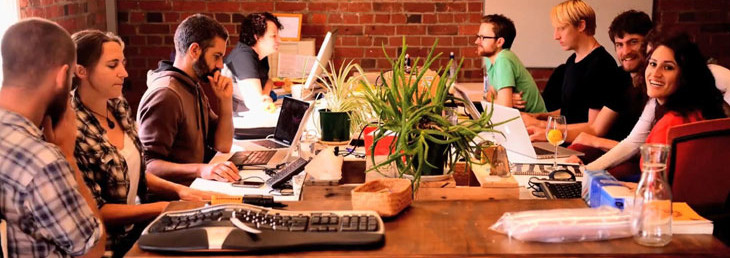Freelancers are creating new ways to get more work by working together

The freelance and gig workforce is exploding in advanced economies. In US, for instance, more than one third of the labor force is already working independently. According to a study released by freelancing platform Upwork, 700.000 new independent workers incorporated to its labor force in just one year (2015).
As freelances proliferate, a growing number of this kind of professionals try to fight against isolation and economic uncertainty by informally banding together and creating their own work communities. Innovative collaboration groups between freelancers leverage not just common co-working spaces. Looking for a mix of autonomy and interdependence, these new kind of organizations can also work as a mutual support groups sharing networks, open-source technology and other resources for reciprocal benefit.
But a new and still unusual level of collaboration among freelancers goes beyond this more basic kind of relationship creating new ways to get more work by working together; organizing new models of interdependent and independent working communities, sharing larger aims and collaborative projects with fellow freelancers.
We already mentioned one of them in here. Starting as a provider of co-working space, Netherlands-based Seats to Meet (S2M) decided they wanted to redefine work and workers. S2M’s value proposition for independent professionals includes providing its users with insight into the knowledge and skills of other visitors present at a S2M location. Besides, S2M offers the possibility to pay for a seat not with money but with these knowledge and skills by supporting the projects of both paying and nonpaying members, often through a strategic advice in their area of expertise.
But it is New Zealand’s Enspiral Network who really represents a new inspiring level of freelancer collaboration and community. Initiated in 2008 by Joshua Vial as a co-working space in the city of Wellington, Enspiral soon started to experiment with new forms of freelancer collective organization to evolve into an open cooperative linking independent workers and social initiatives in a global network of mutual aid and collective action.
The group soon became a cooperative, co-owned by its members. Currently, about 40 of these co-owners form a “core group” related to about 250 other “contributors” participating in its network. Its infrastructure is managed by a cooperative Foundation. The organization mixes independence and collectivism. Administrative and other support systems are funded collectively by the group’s members, but they can also fund one another’s business experiments and offer some professional help if needed.
Organized around the production of commons, the group has already created together about 15 small companies called “ventures”. For instance, Enspiral Services, a “market-facing” entity with the goal of promoting their services collectively; an online organizing tool called ActionStation; the education platform Chalkle; or the engine for alternative digital journalism Scoop.
Some of these projects were born out of their own necessity of digital tools to work and be organized collaboratively. This way, they also developed from scratch My.enspiral as a bookkeeping tool or Co-budget, a platform that allow members of the group and other contributors to allocate funds for their own projects or other causes. The tool they developed as a platform for their network’s decision-making, Loomio, is probably their most popular development, currently used all over the world by all sorts of organizations including companies, governments, political parties or activism groups.
Enspiral
More People Working on Stuff that Matters
